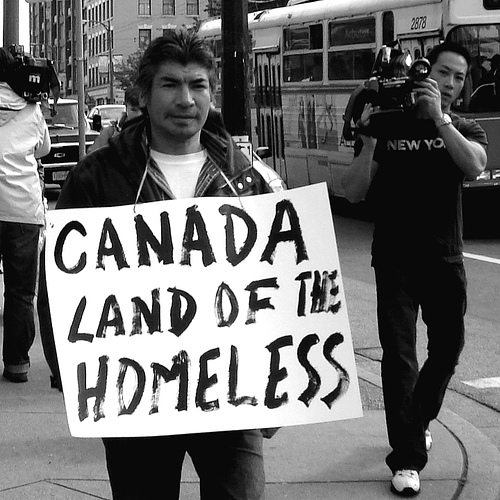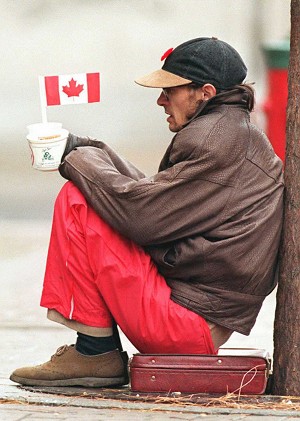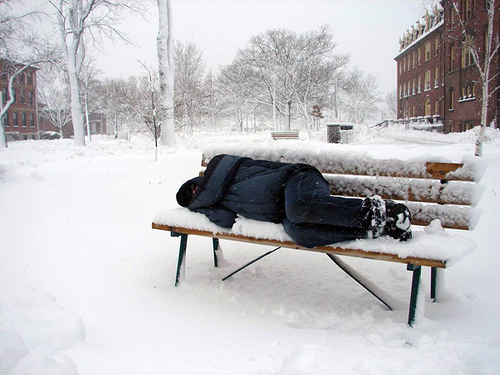Canadian Governance That Involves Institutionalized Theft and
Wealth Sharing With China is Coming to an End
© 2008 Brad Kempo B.A. LL.B.
Barrister & Solicitor
Millions of Canadians are tormented directly or indirectly by the paradigm of governance that’s been in place for at period of time that straddles two generations. This is intolerable and change is imperative. Since government on three levels has been hijacked by the rich and Chinese, it’s up to grassroots organizations committed to altering the status quo to do what’s necessary to force fundamental change, no matter how unpalatable the consequences.
There are hundreds of thousands of Canadians, and children, who continue to live in poverty. Campaign 2000’s 2009 pre-budget submission, Family Security in Insecure Times: Poverty Reduction as Poverty Prevention, by Laurel Rothman, states:
Nearly two decades after the unanimous 1989 House of Commons resolution to end child poverty in Canada, 760,000 children and their families – almost 1 child out of every 9 – still live in poverty when measured after income taxes. The rate of child and family poverty in Canada was essentially the same in 2006 as it was in 1989 despite an unprecedented period of strong economic growth since 1996. There have been cyclical variations, reflecting recessions and recoveries, but the high rate of child and family poverty has remained tenacious. This figure does not include the shameful situation of First Nations’ communities where 1 in every 4 children is growing up in poverty.
And there are well over a hundred thousand and probably double that who are homeless in one of the wealthiest countries in the world. Exact statistics are impossible to ascertain with accuracy.


Here are two stats eight years apart that indicate there's been a 3 to 4 times increase during that period:
[O]n any given night in the year 2000, there were, sleeping in shelters or on the street up to 10,000 people in Montreal, up to 5,000 in Vancouver, and anywhere from 1,000 to 2,000 in each of Edmonton, Calgary, Ottawa, Winnipeg, Hamilton, Halifax, Saskatoon and Regina.
Source: evangelicalfellowship.ca
MP Tony Martin (Sault Ste. Marie, NDP) said the following on May 8, 2008:
I went to Calgary, Alberta, where oil is king and where the new economy is obvious from the rising skyscrapers that pop up almost daily in that city of great wealth, only to discover at the foot of those buildings some 3,500 to 4,000 people living on the streets and homeless.
[…]
Canada's rich are getting richer while the poor get poorer and the middle class stagnates. Between 1980 and 2005, median earnings among Canada's top earners rose more than 16% while those in the bottom fifth saw their wages dip by 20%. Those in the middle are making about a buck a week more than in 1980. Almost 900,000 Canadian children are still poor and more than one-third of these deprived children are in the care of single mothers.
Quoted in Witnessing the Death Knell of Economy Monopolization and Wealth Plundering in the Last Democratic Fiefdom
One statistic is haunting. In January 2009, the Salvation Army estimated that “more than 80 people die each year from over-exposure to cold”. That’s more than eighty counts of depraved indifference murder a year as far as the law is concerned. That’s institutionalized serial murder.

Not surprisingly the Conservative's 2009 federal budget brought no relief at all:
Fed budget 2009: Billions in new housing spending, but not for those who need it the most
by Michael Shapcott
Wellesley Institute
January 27, 2009
Federal budget 2009 promises to deliver billions upon billions of dollars over the next two years in new housing investments – the single biggest amount of new housing spending in more than two decades. This is a solid victory for housing advocates, who created a powerful national campaign to convince the federal government to include housing in their economic stimulus plans. But most of the new dollars will flow quickly to people who already own their home and want to re-pave their driveway, or cottagers who want to add a new sun deck. The hundreds of thousands who will experience homelessness this year won’t get a single penny in desperately needed new programs and services.
[…]
The federal government announced plans in September of 2008 to extend its national homelessness program for five years. The funding was frozen at $135 million annually for the entire country – basically the same level as the past decade.
A Fiefdom treatise chapter compiled recent information, assembled the evidence and made the following argument:
Canada – the Failed State: Poverty Rates Prove Wealth Plundering
Still Rampant by the Country’s Not So Invisibly Rich
© 2007 Brad Kempo B.A. LL.B.
Barrister & Solicitor
Several million people will feel the effects of fundamental change in Canada – they’ll have a roof over their heads, be able to eat regularly and have appropriate clothing and school supplies. Recent statistics from British Columbia, governed by a premier who is a die-hard totalitarian and unwaveringly loyal to the plundering rich and Chinese, prove that one of the wealthiest countries in the world has an abominable record when it comes to the economically disadvantaged.
In terms of have and have not provinces, B.C. is in the former category and yet has the highest poverty rate in the country. So where is all the money going?
Then there’s Canada’ largest and most economically prosperous city - Toronto: same conditions: one in three live in poverty. So where is all the money going?
B.C.'s child poverty rate worst in Canada: report
Fourth year in a row B.C ranked last by report
November 26, 2007
CBC News
A new report says B.C. had the highest child-poverty rate in the country for 2005, based on the latest available income numbers from Statistics Canada. According to the report written by the B.C. Child and Youth Advocacy Coalition, one out of every five children lives in poverty. It said almost 21 per cent of children live below the poverty line. The national average was just under 17 per cent.
It's the fourth year in a row B.C ranked last in the report.
Coalition chairperson Michael Goldberg said the province needs to come up with "a child poverty reduction plan, which has very specific targets, and timelines.
"That's been done in Newfoundland. Quebec has had one for a number of years. They have an anti-poverty act they have to follow and their figures are way down compared to most other provinces," said Goldberg on Sunday.
Goldberg said it's shameful that British Columbia has so many poor children despite doing so well economically.
The United Way of Greater Toronto says that number represents about 93,000 households raising children -- a figure that has doubled since 1990.
The poverty rate is almost 10 per cent higher than the national average, according to the report, entitled "Losing Ground."
One in three T.O. families lives in poverty: report
toronto.ctv.ca
November 26, 2007
Almost one in three families in Toronto is living in poverty, a "deeply troubling" statistic that makes the city the poverty capital of Canada, according to a new report.
Hansard
November 26, 2007
L. Krog (NDP, Critic Attorney General):
I suggest to the member opposite: let us talk about moving forward. Let us talk about doing something dramatic. Let us call on the government to do more instead of simply saying, "Great job. Well done, Premier. It's grand. Everything's fine in British Columbia. It's a rosy picture" — notwithstanding that we're once again, for the fourth year in a row, the bearers of the great news that we are first again in child poverty in Canada — first again. Four years in a row, the worst province.
[...]
C. James (NDP Leader of the Opposition):
For the fourth year in a row, British Columbia is the province with the worst record on child poverty. B.C. Liberal policies and inaction are making it harder for families to get by, and the result is that more and more children are living below the poverty line. It's a shameful and alarming record, and one this government refuses to address.
My question is to the Minister of Employment and Income Assistance. At a time when his government is sitting on record surpluses, how can he justify his government's shameful record on child poverty?
Hon. C. Richmond (Lib. Minister of Employment and Income Assistance):
We on this side of the House take the well-being of children very seriously. We are dedicated to improving their lives.
[...]
J. Brar:
It's hard to understand what the minister means by "taking seriously." Let me add to list of what the minister has said. Since this government took over, the number of homeless people in the province has doubled. Since this government took over, the gap between rich and poor has doubled and is the highest in the country.
Too many people in British Columbia are being left behind by the policies of this government. Clearly, the government policies are not working when it comes to reducing child poverty in British Columbia.
[...]
N. Simons:
The minister's answers are absolutely shocking. They're not just shocking to the opposition. They're shocking to most British Columbians, who feel that this government has failed children in this province.
We're six and a half years into his mandate, and he's still relying on his speech from two years ago in which he said the numbers were outdated. Well, this minister is outdated. The child poverty situation in this province is as bad now as it was two years ago when he mentioned that same statistic. What is the minister going to do to address the issue today?
[...]
I don't know if the minister opposite knows who these children are, but it's more than statistics, and it's more than regurgitated answers from two years ago.
This is a child poverty situation that leads Canada. We are number one in child poverty — number one. The minister is always proud about everything else he seems to be making up, but we're number one in child poverty.
I know who those children are. I see those children. They go to school hungry. They go to school with clothes that aren't the same as their friends in school, and this minister is thinking about regurgitating old statistics.